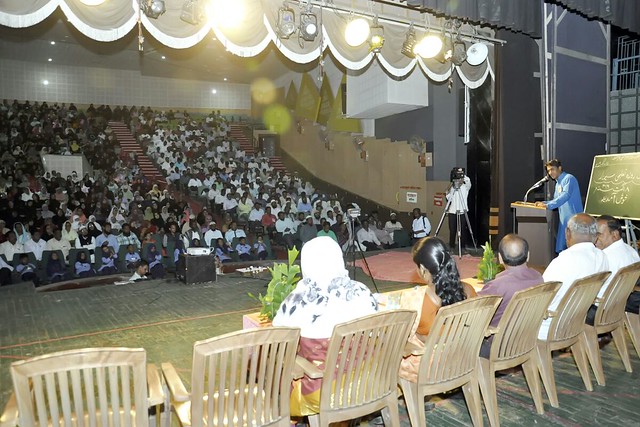By Imran Inamdar for TwoCircles.net
Solapur, Maharashtra: There are around 122 Urdu primary schools in Solapur, with almost 40,000 Muslim students studying in these institutions. The fact that Urdu schools have been suffering in various parts of the country has often been written about, but an event in August highlighted the true extent of how bad the conditions are in the schools of Solapur, which has about 10.22% Muslims according to Census 2011.
On August 7, a workshop was organised to impart basic Urdu Rhythmic teaching for primary and middle school teachers. The workshop was attened by over 1,000 teachers and received a positive response.
While the organisers of the workshop—Athar Parvez Dafedar and Mahmud Nawaz—must be commended for this effort, it begs another question: what is the level of teaching in these primary schools if teachers have to attend workshops for something so simple and basic? How qualified are they to even teach the students? And more importantly, what is the administration doing in this regard?
Therefore, it came as no surprise when the organisers said, “We are struggling to improve the quality of education in Urdu primary schools. This workshop was an attempt to try and bridge the gap between these schools and English-medium schools.

Raja Bagawan, and retired headmaster and school board committee member welcomed the workshop and said these initiatives were extremely important in the current scenario. “A large number of teachers are not well versed to teach even basic reading writing skills. During my years, I found out that nearly 40% of students, studying in Class 5, can’t even write their name in their mother tongue. Who else but teachers are responsible for this appalling condition?” he asked.
He further slammed school authorities and teachers for not carrying out an remedial teaching activity properly, which was planned especially for slow learners.
“The lack of familiarity with basic writing skills is a very serious issue for Urdu medium students…nearly 30%-70% of students in government schools, and even some private school, are lagging behind,” said headmaster AM Aleem.
He alleged that a large number of teacher remained negligent of their duties. “There is a high dropout rate at high-school level and this workshop shows one of its main reasons. Only the appointment of the efficient and hard-working teachers coupled with good administration which can change the scenario,” he further added.
However, one cannot ignore the importance of such a workshop for the teachers, who lauded the initiative. “Sahiba Siddiqui and Javeria Inamdar, two teachers who work at a Zilla Parishad primary school, said, “This will be of immense help to us. We came across a very interesting method of rhythmic basic urdu teaching and will ensure that these methods are passed onto the students.”
On the condition of anonymity, a young teacher said that it would be wrong to believe that all teachers were at fault. He further added that imposition of different extra curricular activities form the concerned govt. department also hampers the teaching learning process.
Ameer Shah, a resource person of the workshop and a primary teacher in Jalgao district, said, “Thanks to this workshop, my 23 steps of Urdu basic teaching are working nicely ang giving positive results. In a few weeks, I will be able to teach even a first standard student identify and read fluently 2-6 letter words.” He also requested Urdu teachers to refer to the Urdu dictionary more often and teach the students to do the same, and also put some time in learning new teaching techniques.
